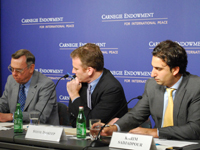Registration
You will receive an email confirming your registration.
Almost a year ago, the controversy surrounding Iran's presidential election spurred the largest popular uprising since the 1979 revolution. While it appears that the government has gradually succeeded in quashing the opposition momentum, deep internal rifts—both among the country's political elites and between the regime and the general population—remain.
NPR’s Steve Inskeep moderated a conversation between leading Iran analysts Abbas Milani of Stanford University, Gary Sick of Columbia University, and Carnegie’s Karim Sadjadpour, on the stability of the regime and how the United States should deal with the Islamic Republic.
The Political Situation in Iran
The June 12, 2009 presidential election spurred a fundamental change in Iran. Although no alternative strong enough to overthrow the regime has emerged, the panelists agreed that the elections marked the end of the status quo.
- Popular Upswell: Milani asserted that the current regime’s days are numbered, citing as evidence the June 15 mass protest, where three million Iranians organized spontaneously against the tampered election.
- A Monopoly of Coercion: After the election, it was clear that “the Islamic Republic of Iran is neither Islamic or a Republic,” said Karim Sadjadpour, quoting the late Grand Ayatollah Hossein-Ali Montazeri. The government forces, in particular the Iranian Revolutionary Guards Corps (IRGC), have a monopoly of coercion and have taken draconian measures to suppress the opposition. They are aided by the tremendous amount of resources at their disposal, many of which originate from Iran’s oil wealth.
- The Nature of the Revolution: Gary Sick noted a clear mutation of the nature of the Islamic Revolution, exemplified by four significant changes:
- The regime no longer trusts the Iranian people. In the past, it could count on a substantial portion of the street for support; this is manifestly no longer the case.
- The regime also no longer trusts free and fair elections.
- With the exception of a small cohort of radical Ayatollahs, the regime no longer trusts the clerical establishment. Clerics who dissent are now often silenced.
- The military now actively participates in politics.
- The regime no longer trusts the Iranian people. In the past, it could count on a substantial portion of the street for support; this is manifestly no longer the case.
The IRGC’s Role in Iran
As the regime has grown increasingly hard-line, particularly since the rise of President Ahmadinejad, the IRGC’s influence in all areas has risen.
- The Economy: Milani described the IRGC as a “military junta” that runs the Iranian economy. Over the past several years, he said, the IRGC has received $30 billion dollars in no bid contracts.
- Foreign Policy: According to Sadjadpour, the IRGC is also responsible for formulating Iranian foreign policy in key geostrategic states such as Iraq, Lebanon and Afghanistan.
- International Sanctions: Through corruption and smuggling, the IRGC has remained relatively untouched by the various iterations of international sanctions imposed on Iran, explained hey have even profited off of the sanctions.
- Decision-Making: All three panelists agreed that the triumvirate of Ayatollah Khamenei, President Ahmadinejad, and the IRGC form the decision-making structure of the regime. Whereas Ayatollah Khomeini relied on his legitimacy from the religious establishment, Sadjadpour explained that “Khamenei—in large part due to his lack of religious credentials—has had to rely on the barracks for his.” Khomenei’s dependence on the IRGC for credibility has resulted in a burgeoning of their power. In many cases, Khomenei has even ceded decision-making power to the IRGC, in particular in regards to quelling protesters.
The IRGC is now the “arbiter of the ideology,” Gary Sick asserted. They have ultimately usurped the authority once held by the clerics.
The Green Movement
While the Green Movement has been criticized for its amorphous and decentralized nature, its members are united by one common call: that every vote be counted. There is a growing demand for a democratic revolution.
The nominal leaders of the Green movement, former regime insiders Mir Hussein Moussavi and Mehdi Karoubi, have been heavily criticized, but Sadjadpour argued that they deserve credit for resilience. Borrowing from a popular phrase from the 2008 U.S. presidential campaign, Sadjadpour suggested that Moussavi and Karoubi needed to do a better job reaching out to “Ali the Plumber.” In other words, Sadjadpour explained, the movement should “focus on the prose of governing.”
Iran Moving Forward
Both Milani and Sadjadpour agreed that the next flashpoint in Iran will likely revolve around economic issues. For years, the Iranian government has provided billions in subsidies for basic foodstuffs and petroleum. The reductionend of these subsidies and the concomitant rise in prices and potential rampant inflation will likely mobilize the people to protest. According to Milani, this removal of subsidies is “really playing with fire.” Ahmadinejad’s government has decimated the private sector during his reign and a cut back on subsidies may provide a spark for many who already aggrieved by their current economic situation.
Turning to international efforts to isolate Iran via sanctions, Sick pointed out how ineffectual sanctions have been in halting the Iranian nuclear program. In the 1990s Iran had no centrifuges. As sanctions have increased over the years, Iran has built over 9,000 centrifuges. Sick asserted that the United States and the international community have never successfully used sanctions as a lever to work with the regime. “Over the past 20 years, the United States and Europe have not had a prudent or strategic policy” for dealing with the Iranian nuclear policy, agreed Milani.
